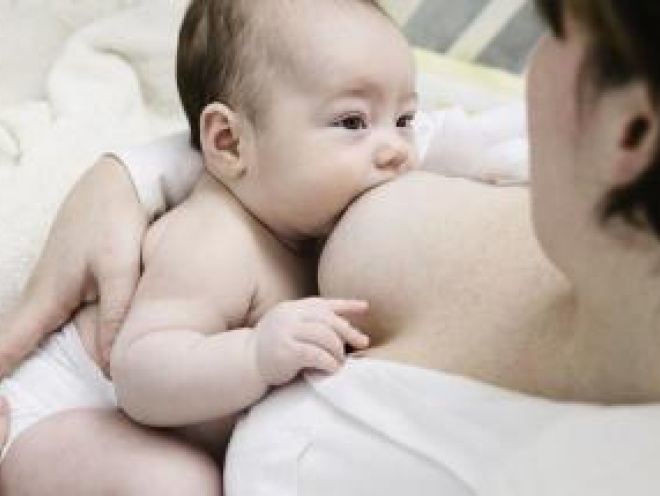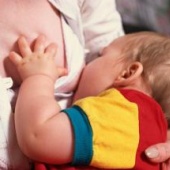Sore nipples can be a problem in the early days of breastfeeding and beyond. This article discusses causes of sore nipples and how to ease the pain.
Some women get sore, cracked or painful nipples in the early days of breastfeeding.
Sore nipples are the most common breastfeeding complication and the most common reason women give up breastfeeding (NHS, 2019a). With a little breastfeeding support this can often easily be rectified.
What causes sore nipples when breastfeeding?
Some women find their nipples get very sore a few days after they begin breastfeeding their baby.
This usually happens if your baby isn’t positioned or attached well at the breast. If a baby only sucks the nipple rather than taking a good mouthful of breast, then their tongue or roof of the mouth may rub on the nipple. This causes nipples to get sore quickly and might cause nipple cracking (NHS, 2019a).
What can help sore nipples?
Breastfeeding shouldn’t be painful, so it’s important to get breastfeeding support right from the start (NHS, 2019a). Breastfeeding support should be offered by a midwife before you leave the hospital or birth centre. They can help you to position and attach your baby to your breast, and explain the signs that your baby is feeding well (NHS, 2019a).
If your nipples are getting sore but you’re already home, it’s a good idea to ask for breastfeeding support from a midwife, health visitor or breastfeeding counsellor as soon as you start to notice a problem. They can watch you while you feed your baby and check your baby is positioned well and feeding effectively.
You might also be able to feel when your baby is well attached. Your nipple should rest comfortably against the soft palate at the back of their mouth. If the nipple is nearer to the front of their mouth, your baby might be poorly attached. This can cause pinching of your nipple against the hard palate, which can cause pain.
You can check with your local NCT group what local breastfeeding support might be available. You may be able to drop in to a breastfeeding group for support or you might be able to have an NCT breastfeeding counsellor visit you at home. You can call the NCT support line for practical and emotional support on 0300 330 0700.
Your midwife, health visitor or breastfeeding counsellor might be able to help identify any other underlying issues (NHS, 2019a). Read on to find out more…
What other less common causes of sore nipples are there?
Engorgement
When breasts become full of milk, they might become sore (Breastfeeding Basics, 2015). This can happen when your breastmilk first comes in.
Feed your baby as often as they would like and for as long as they like. You can also try using a warm heat pack or having a warm shower before feeding or expressing milk, or use cold packs after feeding for pain relief (NICE, 2017).
Flat or inverted nipples
Nipples come in all sorts of sizes and shapes. While most protrude, some are flat or inverted.
These differences don’t usually affect your ability to breastfeed. Yet if one or both nipples are flat or inverted, you might find it takes you a bit longer to get breastfeeding established. It can help to get extra support with positioning and attachment.
Various techniques and devices have been suggested to help 'draw out' inverted nipples but it's uncertain how effective they are. Things that can help include stimulating the nipple before feeding, holding the breast while baby is latching on, or using an exaggerated latch position (La Leche League, 2016a). Here's a video showing you how to get an exaggerated latch or ‘flipple’.
Tongue tie
Tongue-tie is when the skin joining the underside of the baby’s tongue to the floor of their mouth (frenulum) restricts how they can move their tongue. This causes difficulty in latching, which can result in sore nipples.
Other symptoms of tongue tie include: your baby having difficulty latching or staying latched onto the breast; nipples becoming squashed in your baby’s mouth; feeding very frequently or for a long time; slow weight gain; or making a clicking sound while feeding. Some parents notice that their baby has difficulty moving their tongue from side to side or sticking out their tongue.
If you’re experiencing breastfeeding difficulties and you think your baby might have tongue-tie, speak to your health visitor and you could ask to be referred to a local tongue-tie practitioner. If your baby has tongue-tie, they might suggest dividing your baby’s frenulum, which involves cutting the piece of skin; it's a quick, simple, painless procedure and can immediately improve feeding (NICE, 2017). You can find an independent tongue-tie practitioner here.
Thrush (candida) infection
Breast or nipple pain can sometimes be caused by a thrush infection. Candida can infect your nipples if they become cracked or damaged.
Babies who are breastfed can also develop thrush in their mouth. This is likely to be the cause if you have severe pain in both breasts for up to an hour after breastfeeding, despite weeks of pain-free breastfeeding (NHS, 2018).
Symptoms in the mum
- Feeling new pain in or behind the nipples or through the breast after feeds. Pain can be described as shooting or pins-and-needles pain. Pain can last for several hours after a feed.
- It’s unlikely to be thrush if it’s only in one breast, accompanied by fever or a red/dark patch on the breast (NHS, 2018).
Symptoms in the baby
- Unsettled during feeds, white film on lips, and white spots in their mouth, which don’t come off if rubbed; persistent nappy rash (NHS, 2018).
Treatment
If you think you have thrush, see your GP. They can prescribe cream to treat you and your baby. It's important that both mum and baby are treated for thrush because it is very easily transmitted from one to the other. Other members of the family might need to be treated too (NHS, 2018).
It's recommended that you wash and sterilise several times any bottle teats, dummies or anything else that has been in baby’s mouth. It's also best not to use any expressed milk from when you had thrush because it might be contaminated with thrush (NHS, 2018).
Mastitis
Mastitis is an inflammation of the breast caused by uncleared blocked ducts or an infection, that often causes the breast to become darker or red (depending on skin colour) and inflamed. See our article on mastitis for more information on symptoms and treatment. Continue to feed your baby and make sure they are attached well to the breast.
Mastitis can lead to a breast abscess (collection of pus), which might need draining, so you may want to see your GP to discuss antibiotics (NHS, 2019b).
Nipple vasospasm
Sometimes painful and sore nipples can be caused by nipple vasospasm, where blood flow is restricted to the area. This can be triggered if a baby’s latch is shallow and can also be connected to Raynaud’s phenomenon (a condition affecting blood supply) (Breastfeeding Support, 2018).
Some mums’ nipples look white (blanched) after a feed and they may experience a deep pain or burning sensation. If this is the case, avoid exposing your nipples to the cold, wear warm clothing and breastfeed in a warm environment (NICE, 2017).
Should I limit my baby’s time at the breast to avoid sore nipples?
Limiting your baby’s time at the breast is likely to decrease your milk supply. Continue breastfeeding if you can and get breastfeeding support to help you solve any issues like a poor latch or attachment (NICE, 2017).
What are nipple shields or breast shells and can they help?
Nipple shields are thin, protective covers worn over the nipple while breastfeeding. Breast shells are hard, protective covers worn inside the bra.
The use of nipple shields is controversial. They can reduce milk transfer but their use can help women to continue breastfeeding (McKechnie and Eglash, 2010).
For some women and babies, nipple shields can help to establish breastfeeding and make it more comfortable. They might also compensate for immature feeding behaviour in premature babies. On the other hand, they might reduce milk supply, leading to premature weaning from the breast. Babies can also become reliant on them, not wanting to feed without (Chow et al, 2015).
Nipple shields, while effective in helping some women to continue breastfeeding, do not correct the underlying problem (a poor latch). So skilled help is recommended for sore nipples and for women using nipple shields (La Leche League, 2016b).
Breastfeeding support can help you identify and solve any breastfeeding issues (NICE, 2017; NHS, 2019).
Treatment of sore nipples
Early breastfeeding support can help make sure your baby is positioned and attached well. Some women treat nipple cracks with nipple cream, but the evidence for this is inconclusive. You might wish to consider expressing breast milk if your nipples are very sore or cracked.
Getting sore nipples from breastfeeding suggests that it could be helpful to get support with the positioning and latching of your baby from an appropriately trained person (NHS, 2019a).
For more information, read our article on self-help tips for sore nipples.
This page was last reviewed in March 2021.
Further information
NCT supports all parents, however they feed their baby. If you have questions, concerns or need support, you can speak to a breastfeeding counsellor by calling our helpline on 0300 330 0700, whether you are exclusively breastfeeding or using formula milk. Breastfeeding counsellors have had extensive training, will listen without judging or criticising and will offer relevant information and suggestions. You can also find more useful articles here.
National Breastfeeding Line (government funded): 0300 100 021.
Best Beginnings - Bump to Breastfeeding DVD Chapter 7 'Overcoming Challenges'.
Breastfeeding Basics. (2015) Sore nipples. Available at: https://www.breastfeedingbasics.com/articles/sore-nipples [Accessed 22nd March 2021].
Breastfeeding Support. (2018) Nipple vasospasm and breastfeeding. Available at: https://breastfeeding.support/nipple-vasospasm-breastfeeding/ [Accessed 22nd March 2021].
Chow S, Chow R, Popovic M, Lam H, Merrick J, Ventegodt S, et al. (2015) The use of nipple shields: a review. Front Public Health. 3:236. Available at: https://www.ncbi.nlm.nih.gov/pmc/articles/PMC4607874/ [Accessed 22nd March 2021].
La Leche League. (2016a) Inverted nipples. Available at: https://www.laleche.org.uk/inverted-nipples/ [Accessed 22nd March 2021].
La Leche League. (2016b) Nipple shields. Available at: https://www.laleche.org.uk/nipple-shields/ [Accessed 22nd March 2021].
McKechnie AC, Eglash A. (2010) Nipple shields: a review of the literature. Breastfeed Med. 5(6): 309-314. Available at: https://www.ncbi.nlm.nih.gov/pmc/articles/PMC3014757/ [Accessed 22nd March 2021].
MedicineNet.com. (2018) Breast anatomy. Available at: https://www.medicinenet.com/breast_anatomy/article.htm#breast_facts [Accessed 22nd March 2021].
NHS. (2018) Breastfeeding and thrush. Available at: https://www.nhs.uk/conditions/pregnancy-and-baby/breastfeeding-and-thrush/ [Accessed 22nd March 2021].
NHS. (2019a) Sore or cracked nipples when breastfeeding. Available at: https://www.nhs.uk/conditions/pregnancy-and-baby/sore-cracked-nipples-breastfeeding/ [Accessed 22nd March 2021].
NHS. (2019b) Mastitis. Available at: https://www.nhs.uk/conditions/mastitis/ [Accessed 22nd March 2021].
NICE. (2017) Breastfeeding problems – management. Available at: https://cks.nice.org.uk/breastfeeding-problems#!scenario [Accessed 22nd March 2021].





